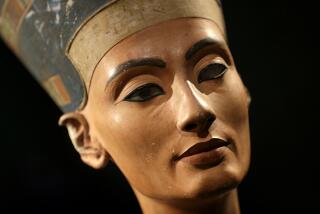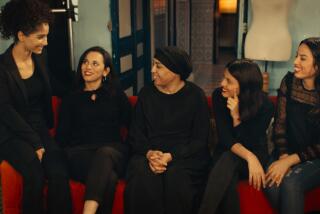The Veil Returns in Surge of Tradition
- Share via
SHARJAH, United Arab Emirates — Samira Ismaili can see the world around her through a thin slit in her veil. The world sees little more of Ismaili than her eyes, the rest of her concealed by folds of black cloth.
Still, among the conservative Arabs of the Persian Gulf, showing even a woman’s eyes is too much. Hard-line Islamic clerics say that the niqab--the eye-revealing veil that gulf women are taking to--can encourage promiscuity.
Women’s eyes are too alluring, the clerics argue. And worse yet, the hard-liners say, some women are wearing kohl--an age-old Arab version of eye-liner--doubling the temptation for men to stare and women to stare back.
In mosques, religious edicts, or fatwas, are handed out urging a return to the gulf’s traditional veil, which covers the entire face. In one fatwa, a Saudi cleric says that “the gates of evil shall open and will be difficult to shut again” if any man can look into a woman’s eyes.
Ismaili’s almond-shaped, brown eyes register hurt when this is discussed, for she believes the niqab is her way to be closer to God.
“I’m at peace because I feel I will not incur God’s wrath,” says Ismaili, 34.
The idea of the veil comes from the Koran, Islam’s holy book, which says women must hide their “adornments” from all but their husbands. This has led to the tradition of Muslim women wearing a whole range of scarves, veils and even masks when outside their homes.
Many Muslim women wear the hijab, which covers the hair--or most of it--but shows the face. Veils that reveal just the eyes have long been used in some places. But in the gulf, tradition dictated a gauzy black cloth that hides the woman’s face entirely and allows her to see the world only dimly.
The wearing of the veil seems to cause as much fuss as any aspect of Islam, both in the Muslim world and outside. Westerners--and some Muslims--argue that it is a way to subjugate women. But other Muslim women say it gives them a comfortable anonymity.
Many Muslim women gave up the veil earlier in the century, wearing Western styles instead to be modern. But with Islam gaining a stronger influence in the last 20 years, so have veil and scarf.
In Sharjah, Ismaili sat cross-legged on the carpeted floor of her home and explained that her life had been a series of veils.
First, she covered her entire face, as her mother had. But after she had an embarrassing stumble, her husband suggested she cover her hair with an abaya, a black cloak, but leave her face showing--so she could see where she was going. Now, with many Arab women returning to tradition, she has taken to the niqab.
Along with piety, reasons given for donning the garment include pressure from family and friends and its current stylishness.
Women wearing the niqab do not socialize with male strangers, but it hasn’t stopped them from taking on careers. It is not unusual to see women wearing niqabs while driving cars or talking on cellular phones.
Fatima, 43, says she was one of the first women in Sharjah to don the niqab seven years ago. She gave up her scarf for the more conservative niqab not from religious conviction, but because her husband pushed her to do so.
“Soon afterward, I welcomed it because my husband stopped nagging that I wore too much makeup or opened my mouth too wide when I laughed,” said Fatima, who asked that her last name not be used.
“Now I can laugh as loud as I want and open my mouth as wide as I like. Nobody is going to know who I am,” she said.
Fatima has heard the criticisms of the niqab’s focus on the allure of women’s eyes and she has stopped using kohl around her eyes.
She did so at the urging of her daughter, a 22-year-old medical student who wears the niqab and considers kohl too enticing.
Most of the anti-niqab clerics are from Saudi Arabia, which sees itself as the guardian of Islamic orthodoxy. They argue that the very anonymity of the niqab can foster immorality, and one fatwa relates a married Saudi woman’s confession of her temptation after donning the niqab.
Despite complaints against the niqab, Ismaili sees it as God’s will and says it has liberated her.
“I feel I have earned my respect. Being anonymous gives me freedom,” she said.
She also has given up wearing kohl and now sits with male relatives or friends only in the presence of her husband.
She said her new, stronger beliefs mean fewer people visit her family, but that doesn’t bother her.
“I prefer that God is happy with me, not that men are,” she said. “I feel God is satisfied with me--and would take me to heaven.”
More to Read
Sign up for Essential California
The most important California stories and recommendations in your inbox every morning.
You may occasionally receive promotional content from the Los Angeles Times.










